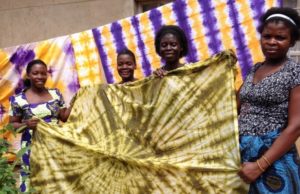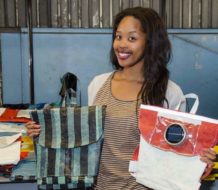Ellen Chilemba is one of Africa’s youngest social entrepreneurs, bringing about change and empowerment for the women left behind by society.
For Ellen Chilemba, being an entrepreneur is about affecting social change and helping others reach success. Her ground-breaking project Tiwale is making waves across the African non-profit sector. Making the Forbes 30 under 30 list in 2015 and with a long way to go until she hits 30, she has a bright future ahead affecting change in Malawi’s development.
Born and raised in Malawi, at the age of 16 she was offered a scholarship to attend the African Leadership Academy in South Africa, where she studied leadership, entrepreneurship and African studies. This experience shaped her immensely and straight after graduating she launched her first major project: Tiwale. This is a social enterprise designed to train women in the apparel industry, and help them escape cycles of poverty in her native Malawi. This was a risk for Chilemba, and she doubted whether taking a year out of studying was good for her career. Fortunately, Tiwale has been extremely successful and she is now studying economics at Mount Holyoke College in Massachusetts while managing her business from abroad.
Believing in gender empowerment
Chilemba believes in women helping women, and that gender empowerment is the key to reducing poverty in her homeland. Gender disparity statistics in Malawi are alarming by global standards. Women have some of the lowest primary school completion rates, low socioeconomic markers and higher than average HIV and AIDS infection figures. Malawi also has one of the world’s highest maternal mortality rates and many young women are forced to leave school and marry at 12 or 13.
With little to no education to speak of, low access to medical care and few economic opportunities, women in Malawi are some of the most vulnerable and marginalized in Africa. These are the conditions that inspired Chilemba to create a project that would improve lives in a big way. She believes that is a key factor as incremental changes are easily undone, frequently resulting into a slide back into poverty.

Tiwale finds success with a cyclic business model
It became apparent to Chilemba that although many women throughout Malawi wore bright, traditionally dyed clothing, most of these clothes were imported from neighboring countries. Having identified a potential business, she began training women to dye-print different fabrics that are then sold to designers as garment material or from their website as tapestries and tote bags. The women are allowed to keep 60% of the profit, while 40% goes back into the company to help to train more women and perpetuate the cycle.
Tiwale means “let’s glow” in the Malawian language, Chichewa. Tiwale’s purpose is to empower, guide and allow women to “lift” themselves out of poverty. Chilemba’s orignal model has grown considerably, and since its inception 3 years ago has branched into two avenues.
The first branch is the fabric design training for women in the community, where their goods are sold through the company and they are free to use their skills to start their own business, or continue working with the program in their facilities.
The other is much more ambitious, offering micro-finance schemes. These begin with leadership and entrepreneurship courses where the participants learn business skills such as inventory and accounting. After the training, the women present business proposals and the most viable ideas are given interest free loans that are repaid over 10 weeks. Tiwale has also introduced a scheme to send promising candidates back to school or college with grants paid for by the vocational courses and resulting profits. Each woman that they help then goes on to help others. Currently they have helped 40 women to become business owners and have taught entrepreneurial courses to 150 more.
What does Chilemba’s future entail?
Not one to be satisfied with her current success, planning is already underway to build an education and entrepreneur center for women. This will be used in a number of ways, giving the participants space to create their products, as well as for further workshops and additional activities. Chilemba sees a future for Tiwale where the company outgrows her involvement and flourishes on its own. She wants to focus next on the education system in Malawi and ways to attract tourism to her “beautiful country.” She says she is “excited by social entrepreneurship and has many more ideas to pursue.” Chilemba is a much needed role model for Malawi. Through her efforts perhaps she will inspire future leaders and entrepreneurs who can further drive change in their homeland.




